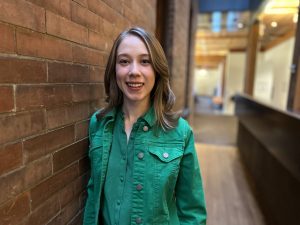Daniela Draaisma Rodriguez is one of 207 teaching assistants currently working with students of the Department of Economics. She is also one of just 14 TAs shortlisted for the 2023-2024 TA Teaching Excellence Award. UofT employs roughly 6000 TAs at the St. George campus and about 8000 across all three campuses.

The Teaching Assistants’ Training Program’s (TATP) Teaching Excellence Award was created in 2003 to recognize the outstanding contributions of teaching assistants at the University of Toronto. The jury examines educational leadership, meaningful contributions to course and curriculum development, and the overall impact on student learning. The announcement of the final winner is expected at the end of April.
Draaisma Rodriguez has been a TA for ECO101 since she was a master’s student and currently serves at the head TA for Professor Nate Vellekoop’s section of ECO102, Principles of Macroeconomics.
“For inexperienced students to have a dedicated TA when they are beginning a difficult course full of completely new concepts is a true gift,” said Vellekoop. “It’s also a gift for professors who are delivering that course to know that your students are in good hands. The learning community is grateful to Dani for her hard work and, yes, that work is excellent teaching.”
Draaisma Rodriguez enjoys working with first year students and helping to form their first impressions of university.
“I feel that one of my specialties is helping them navigate the transition from high school to university,” she said in a recent interview.
Creating a road map for student use as they begin their transition is one part of Draaisma Rodríguez’s approach to teaching.
She creates a summary page of each tutorial that includes the most important concepts and takeaways. Throughout her teaching practice, she has evolved these summaries from handwritten notes based solely on each tutorial’s questions into a concise document that incorporates graphs, figures, and the most important information from texts and other resources.
The evolution of these summaries stems from Draaisma Rodriguez’s commitment to inclusion. In this case, inclusion means ensuring different learning styles are respected and accommodated.
“When you only say the takeaways verbally, it is possible students may not remember them,” Draaisma Rodriguez said. “By having it in written form, they can refer to it later and even use it to help them study for the exam.”
Inclusion is also central to Draaisma Rodriguez’s own PhD research in the field of Health Economics.
“I am interested in conducting research relating to understanding and improving the health outcomes of the general population. This includes the efficient and effective use of healthcare services and reducing inequalities in healthcare,” she explained. “My second-year paper looks to understand the role of individual health shocks and social networks on the healthcare utilization of immigrants to Canada.”
Learning to navigate university systems isn’t just for first-year undergraduates. Graduate students must find commonalities between teaching and research interests, like a focus on inclusion, to learn to balance the different demands of an academic profession. As TAs, Draaisma Rodriguez and her fellow PhD students are already learning how to bring the two together.
“Teaching requires one of the basic life skills that you also need in research, which is being effective in all your communication,” Draaisma Rodriguez said. “In that regard teaching and research are not that different and they actually share some of the same skills.”
In Draaisma Rodriguez’s view, teaching and learning are inseparable too.
“Through teaching you really get to go deep into the core topics. You really need to ask yourself, ‘if I were a student in my class, how would I like this to be taught to me, right now?’ Teaching is a learning experience, and you get to learn with your students along the way.”
Return to the Department of Economics website.
Scroll more news.
